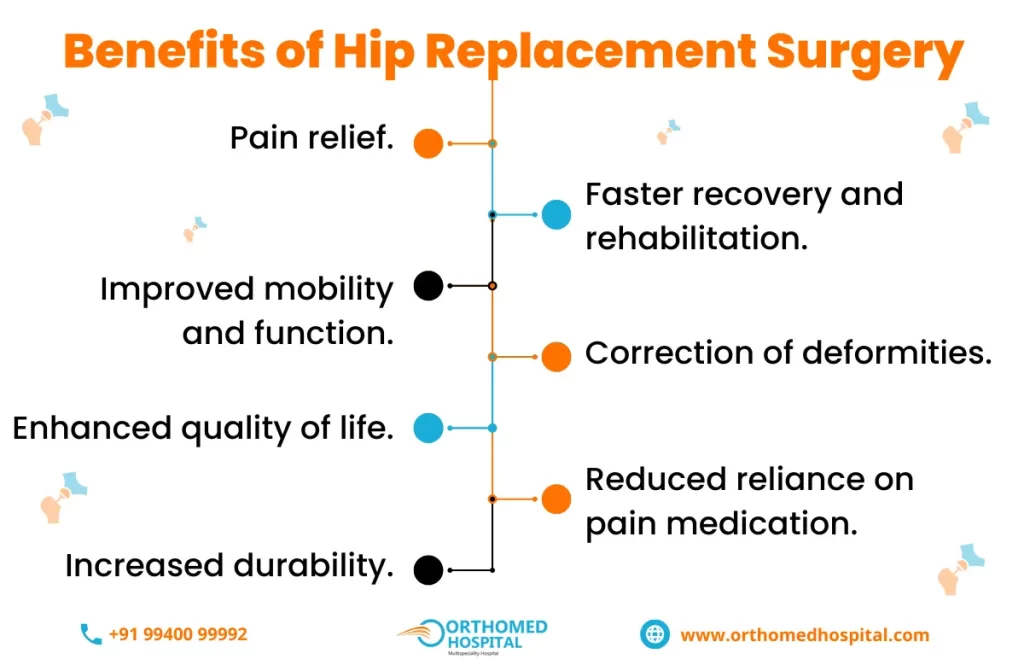Hip replacement surgery, also known as total hip arthroplasty, is a surgical procedure that involves the removal of a damaged or diseased hip joint and replacing it with an artificial joint or prosthesis. Hip replacement surgery in Chennai is a common procedure performed to alleviate pain, improve mobility, and enhance the overall quality of life for individuals suffering from severe hip joint conditions.
In this article, we will provide an overview of hip replacement in Chennai, what patients can expect before, during, and after the procedure along with its benefits.
What is hip arthroplasty/replacement?
Hip arthroplasty, commonly known as hip replacement, is a surgical procedure that involves replacing a damaged or diseased hip joint with an artificial joint, or prosthesis. The surgery aims to relieve pain, improve joint function, and enhance the overall quality of life for individuals with conditions like osteoarthritis or rheumatoid arthritis. The artificial joint typically consists of metal and plastic components designed to mimic the natural hip’s structure and movement.
Who Qualifies for Hip Replacement?
Candidates for hip replacement typically have severe hip joint damage due to conditions like osteoarthritis, rheumatoid arthritis, or traumatic injury. Qualification is determined based on the extent of pain, impaired mobility, and the impact on daily life despite conservative treatments such as medication, physical therapy, and lifestyle modifications. Orthopedic surgeons assess each case individually, considering factors like overall health, age, and the potential benefits of surgery in improving the patient’s quality of life.

Preparation for Hip Replacement Surgery
Before undergoing hip replacement surgery in Chennai, a thorough evaluation and consultation with an orthopedic surgeon are necessary. This evaluation typically includes a physical examination, medical history review, and diagnostic tests such as X-rays and magnetic resonance imaging (MRI) scans. The surgeon will assess the extent of the hip joint damage and determine if hip replacement surgery is the most suitable treatment option.
Procedure
Hip replacement surgery is typically performed under general anesthesia. The surgeon will make an incision along the back or side of the hip to access the joint. During the hip replacement Chennai, the damaged bone and cartilage are removed, and the surfaces of the hip socket and femur are prepared to accommodate the prosthetic components.
The artificial joint, consisting of a metal stem and a socket with a durable plastic liner, is then securely implanted. The incision is closed, and a drain may be inserted to remove excess fluids. The hip replacement surgery in Chennai generally takes a few hours, and patients are closely monitored during their recovery in the hospital.
During Hip Replacement Procedure
Before undergoing hip replacement surgery in Chennai, patients typically undergo a thorough evaluation, including medical history, physical examination, and imaging tests like X-rays and MRI scans. The surgical team will assess the patient’s overall health to ensure they are a suitable candidate for the procedure. Patients may also receive instructions on pre-operative exercises and lifestyle modifications to optimize their recovery.
Anesthesia: Hip replacement surgery is usually performed under either general anesthesia or regional anesthesia, such as a spinal or epidural block. The choice of anesthesia depends on the patient’s health, the surgeon’s preference, and the type of hip replacement being performed.
Incision and Exposure: Once the patient is properly anesthetized, the surgeon makes an incision, typically along the side or front of the hip. The size and location of the incision can vary depending on the specific surgical approach chosen by the surgeon.
Removing Damaged Tissue: The damaged or diseased parts of the hip joint are carefully removed during the hip replacement surgery in Chennai. This includes the femoral head (the ball) and the damaged cartilage lining the acetabulum (the socket). Specialized surgical instruments and techniques are used to minimize tissue damage and preserve as much healthy bone and soft tissue as possible.
Implant Placement: Next, the surgeon prepares the hip socket to receive the implant. A metal or ceramic socket component is typically inserted into the acetabulum, and a stem component is placed into the femur. These components may be secured with cement or press-fit into the bone, depending on the implant design and surgical approach.
Ball and Socket Replacement: A new femoral head, which may be made of metal, ceramic, or a combination of materials, is then attached to the stem. This creates a new ball-and-socket joint, mimicking the natural structure of the hip.
Closure and Recovery: After implant placement, the surgeon carefully checks the hip’s range of motion and stability. The incision will be closed with staples or sutures, and a sterile dressing is applied.
Postoperative Care: Patients are closely monitored in the recovery room before being transferred to their hospital room. Physical therapy and pain management are essential components of the postoperative care plan. Patients are encouraged to start moving and bearing weight on the new hip as soon as possible, typically with the assistance of crutches or a walker.
Recovery and Rehabilitation
Following hip replacement Chennai, patients undergo a comprehensive rehabilitation program to optimize their recovery. Physical therapy plays a crucial role in restoring strength, flexibility, and function to the hip joint. Initially, patients may require the use of assistive devices like crutches or walkers to assist with walking.
Over time, as the joint heals and strengthens, these aids are gradually phased out. Most patients can expect to resume light activities within a few weeks and achieve a full recovery within a few months.
Different Types of Hip Replacement
There are several types of hip replacement surgeries, and the choice depends on the patient’s specific needs and the surgeon’s recommendation:
- Total Hip Replacement (THR): This involves replacing both the acetabulum (hip socket) and the femoral head (upper end of the thigh bone) with artificial components.
- Partial Hip Replacement (Hemiarthroplasty): Only the femoral head is replaced, often suitable for fractures or other conditions affecting only one part of the hip.
- Minimally Invasive Hip Replacement: Involves smaller incisions, potentially leading to quicker recovery and less tissue damage compared to traditional hip replacement.
- Hip Resurfacing: Rather than removing the entire femoral head, this technique trims and caps it with a metal covering. It’s an alternative for some patients, but it’s used less frequently now due to concerns about metal-on-metal implants.
The choice of procedure depends on factors like the patient’s age, bone quality, overall health, and the specific nature of the hip condition. Surgeons determine the most suitable option based on these considerations.
Benefits of Hip Replacement Surgery in Chennai
There are several benefits of hip replacement surgery. Some of them include:
- Pain Relief: The primary goal of hip replacement surgery in Chennai is to alleviate pain caused by conditions like osteoarthritis, rheumatoid arthritis, or hip fractures. By replacing the damaged joint with an artificial one, the surgery effectively eliminates or significantly reduces chronic hip pain, allowing patients to resume their daily activities without discomfort.
- Improved Mobility and Function: Hip joint diseases can severely limit mobility and affect a person’s ability to walk, climb stairs, or engage in physical activities. Hip replacement in Chennai restores joint function, enabling patients to regain their range of motion and perform everyday tasks with ease. This improvement in mobility enhances independence and overall quality of life.
- Enhanced Joint Stability: The damaged hip joint can become unstable, leading to frequent dislocations and falls. The artificial hip joint used in the hip replacement Chennai provides stability and reduces the risk of joint dislocation, allowing patients to move confidently and safely.
- Correction of Deformities: Some hip conditions can cause deformities, such as leg length discrepancies or abnormal gait patterns. Hip replacement surgery in Chennai can address these deformities and restore proper alignment, contributing to improved balance and posture.
Risks and Complications
While hip replacement in Chennai is generally safe and successful, it does carry some risks, as with any surgical procedure. Possible complications include infection, blood clots, dislocation, implant loosening, nerve damage, or fracture. However, these complications are relatively rare, and the benefits of the surgery often outweigh the risks.
Conclusion
To conclude, at Orthomed Hospital, you can get the best hip replacement surgery in Chennai that offers significant relief for individuals suffering from severe hip joint conditions. If you are experiencing hip pain or limitations in your daily activities, consult with our expert orthopedic surgeons here to determine if hip replacement surgery is a suitable option for you.
Read also Best Orthopaedic Hospital in Chennai.


